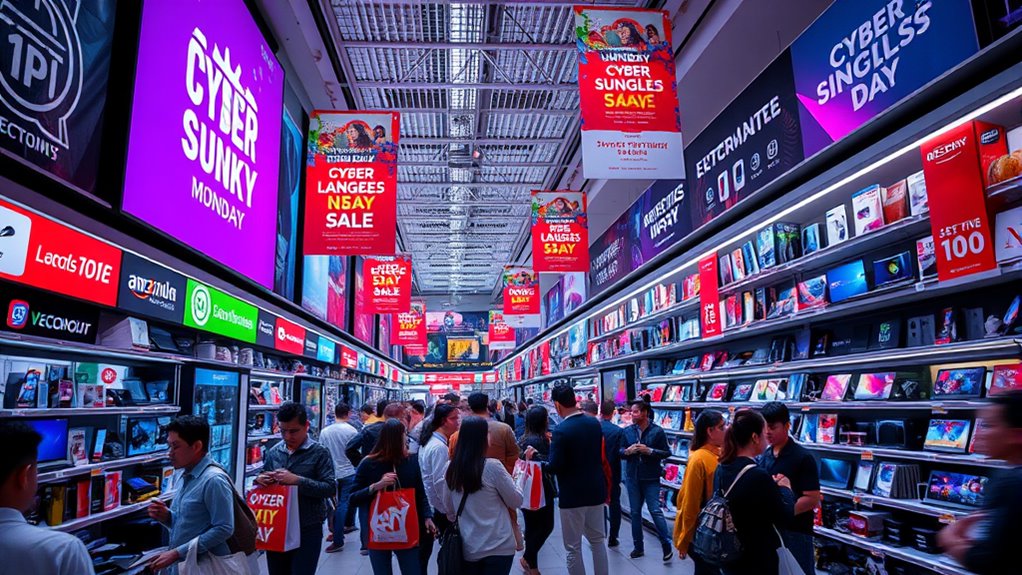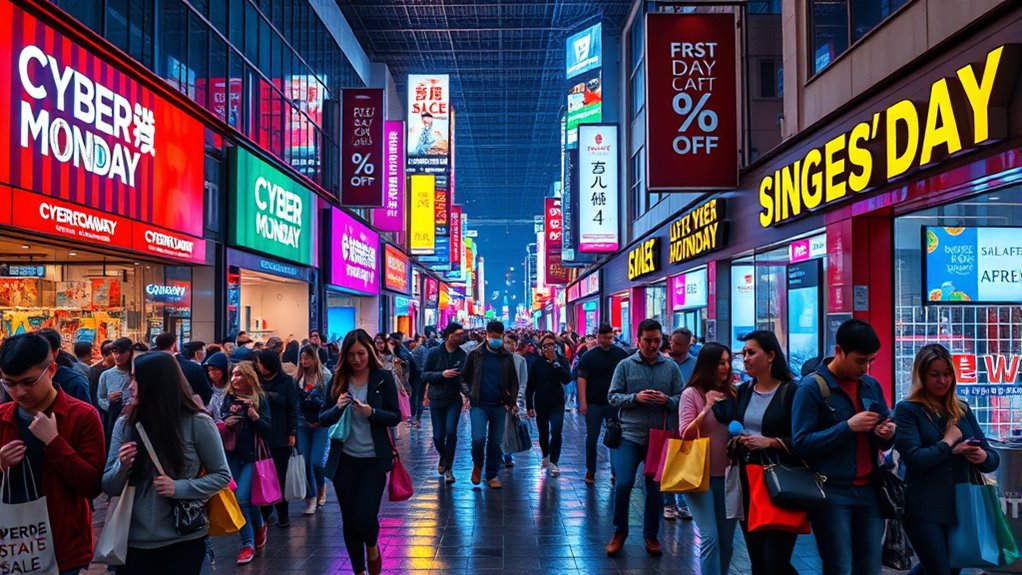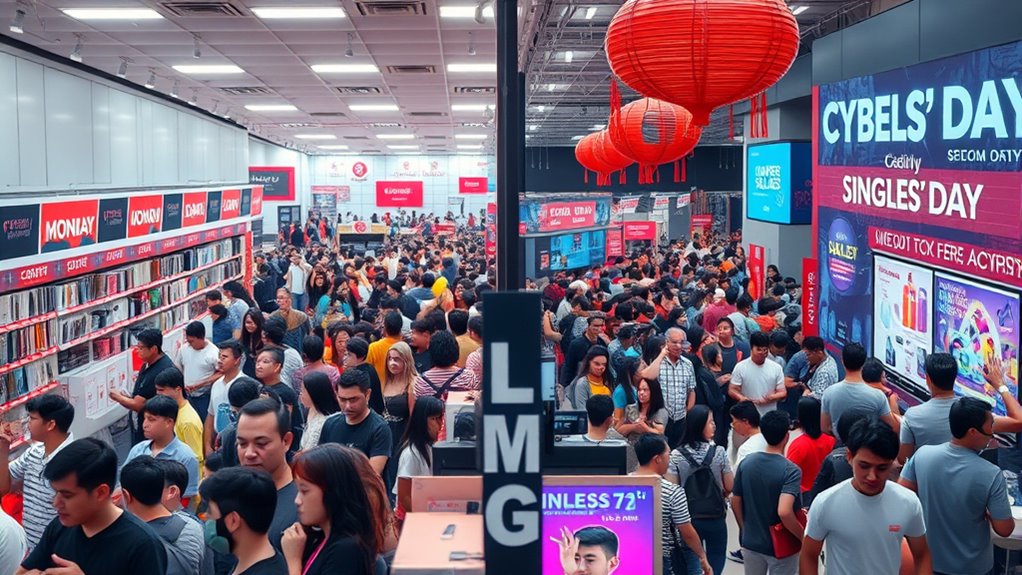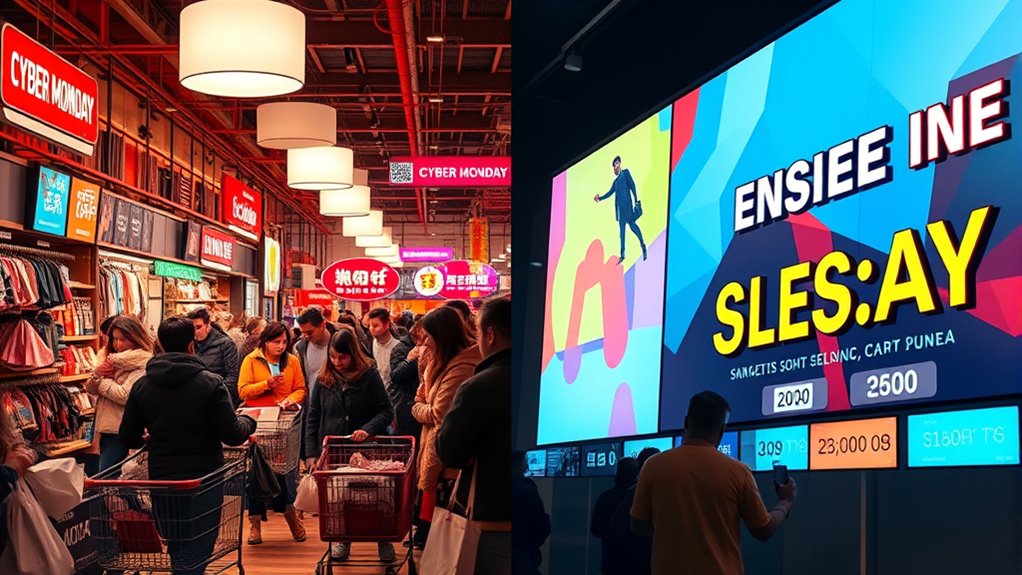Both Cyber Monday and Singles’ Day offer huge discounts and shopping excitement, but each has its strengths. Cyber Monday provides quick deals on electronics and popular brands, mostly in North America, with a streamlined online experience. Singles’ Day, rooted in Chinese culture, offers deeper discounts across many categories, often with longer sales periods and bigger savings. To discover which event matches your shopping style and offers the best value, explore the details further.
Key Takeaways
- Singles’ Day generally offers deeper discounts across more categories, especially in China, while Cyber Monday focuses on electronics and fashion deals.
- Singles’ Day has higher sales volumes due to longer promotional periods and massive social media campaigns.
- Cyber Monday provides a streamlined online shopping experience with quick checkout options, ideal for last-minute deals.
- Singles’ Day’s popularity is growing globally, but Cyber Monday remains dominant in North America and Europe.
- The best event depends on consumer priorities: deeper discounts (Singles’ Day) or variety and convenience (Cyber Monday).
Origins and History of Cyber Monday and Singles’ Day

Cyber Monday and Singles’ Day each have unique origins that reflect different shopping cultures. Cyber Monday started in the United States in 2005, created by retailers to encourage online shopping after Thanksgiving. It emerged as a response to Black Friday, focusing solely on digital deals. Singles’ Day, on the other hand, originated in China in the 1990s as a celebration for single people, with the date November 11 symbolizing four lonely ones. Over time, it transformed into a massive shopping event, driven by Alibaba’s online platform in 2009. While Cyber Monday emphasizes convenience and online bargains in a Western context, Singles’ Day grew from a social observance into China’s largest shopping festival, reflecting different cultural attitudes toward shopping and consumerism. Additionally, the consumer behavior surrounding each event is shaped by their distinct cultural backgrounds and marketing strategies. The economic impact of these shopping days has also expanded significantly, influencing global retail trends and sales volumes.
Global Reach and Popularity of Each Event

While Cyber Monday and Singles’ Day started in different regions with distinct cultural roots, their popularity has now extended far beyond their origins. Cyber Monday remains prominent mainly in North America and parts of Europe, but its influence is growing globally. Singles’ Day, originally Chinese, has become a worldwide shopping phenomenon, especially in Asia and increasingly in Western markets. Both events attract millions of shoppers and generate impressive sales figures. Here’s a quick comparison:
| Aspect | Cyber Monday | Singles’ Day |
|---|---|---|
| Geographic Focus | North America, Europe | China, Asia, Global |
| Growth Trend | Steady, expanding | Rapid, explosive |
| Global Adoption | Moderate | Widespread, increasing |
| Sales Volume | Billions USD | Tens of billions USD |
Your shopping choices are now influenced by this global reach, shaping how and when you shop.
Timing and Calendar Differences

The timing of Cyber Monday and Singles’ Day reflects their cultural origins and marketing strategies, influencing when you participate. Cyber Monday falls right after Thanksgiving in the U.S., typically on the Monday following Black Friday, aligning with the American holiday season. This timing encourages online shopping as consumers gear up for the holiday season. In contrast, Singles’ Day takes place on November 11th, rooted in Chinese culture as a celebration of singlehood, with sales gaining momentum over the last decade. Its date is consistent annually, making it predictable for shoppers worldwide. These differences mean you can plan your shopping around specific cultural events and sales windows. The timing also impacts availability of deals, with Singles’ Day often boasting longer promotional periods than Cyber Monday’s single-day event. Additionally, the shelf life of products relevant to holiday shopping can vary, affecting how long deals or discounts remain advantageous. Being aware of product shelf life can help you maximize savings and ensure you purchase items in time for gifting or personal use. Furthermore, understanding the timing and calendar differences can help you strategically align your purchases with optimal sales periods and product availability, especially considering the exponential growth of online sales during these events. Recognizing these differences allows consumers to better plan their purchases and take advantage of the timing advantages offered by each shopping event.
Types of Deals and Discounts Offered

Both Cyber Monday and Singles’ Day are known for their enticing deals, but the types of discounts you’ll find vary between the two shopping events. On Cyber Monday, discounts often come as site-wide sales, percentage-offs, and limited-time flash deals. Singles’ Day, however, tends to feature massive discounts on specific categories, bundle offers, and early-bird specials. Additionally, the product selection on each day can differ significantly, influencing your shopping choices. The promotion strategies employed by retailers also vary, with Cyber Monday focusing on digital sales and Singles’ Day leveraging extensive social media campaigns to attract shoppers. Moreover, understanding the discount types can help shoppers better plan their purchases for maximum savings, as each event’s consumer behavior patterns influence the kinds of deals available. Recognizing the timing differences between these shopping events can further assist consumers in choosing the best day for their needs.
Shopping Experience and User Engagement

Have you ever noticed how the shopping experience differs between Cyber Monday and Singles’ Day? On Cyber Monday, the focus is on quick, streamlined online shopping. Websites are optimized for fast browsing and checkout, making it easy to find deals and complete purchases efficiently. Singles’ Day, on the other hand, offers a more immersive experience, with interactive features, flash sales, and gamified elements that keep you engaged longer. You might spend hours exploring special promotions or participating in live streams. Engagement tools like countdown timers and exclusive app content make the experience exciting. While Cyber Monday emphasizes simplicity and speed, Singles’ Day creates a more dynamic, entertainment-driven shopping environment that encourages you to stay connected and explore more.
Major Retailers and Brands Participating

Major retailers and brands actively participate in both Cyber Monday and Singles’ Day, leveraging these events to boost sales and brand visibility. They roll out exclusive deals, flash sales, and promotional campaigns to attract shoppers worldwide. Additionally, these events often incorporate strategic marketing efforts that highlight multi-functional furniture and other innovative shopping techniques to enhance consumer engagement. Here are some key players involved:
- Major global e-commerce platforms like Amazon and Alibaba prominently lead these sales events.
- Popular electronics brands such as Samsung and Apple showcase their latest gadgets with special discounts.
- Fashion retailers like Zara and Nike offer limited-time deals to draw in clothing and footwear shoppers.
- Beauty brands like Sephora and L’Oréal launch exclusive bundles and promos to captivate beauty enthusiasts.
Their participation creates a competitive, high-energy shopping environment, making these events attractive for consumers seeking discounts on top brands.
Payment Options and Checkout Processes

During Cyber Monday and Singles’ Day sales, seamless payment options and streamlined checkout processes are essential to keeping you satisfied and preventing cart abandonment. Fast, secure payment methods like digital wallets, credit cards, and alternative options such as Alipay or WeChat Pay make checkout quick and convenient. Many retailers optimize their checkout pages to reduce steps, minimizing delays and frustration. Auto-fill forms, guest checkout options, and clear instructions help guarantee a smooth experience. If payment options are limited or the process is complicated, you’re more likely to abandon your cart and look elsewhere. Both events prioritize offering multiple payment choices and simplified checkout flows, but Singles’ Day, especially in China, often excels in integrating local payment systems seamlessly into the shopping experience. Payment options play a crucial role in enhancing the overall shopping experience during these major sales events. Incorporating mindfulness techniques into your shopping routine can help reduce stress and improve decision-making during busy sales periods. Additionally, ensuring that the checkout process is optimized for mobile devices can greatly improve user satisfaction and conversion rates. Optimizing user interface design can further streamline navigation and make the checkout experience even more effortless for shoppers.
Impact on Retail Sales and Economy

The streamlined payment options and efficient checkout processes seen in Cyber Monday and Singles’ Day sales directly fuel their impressive impact on retail sales and the broader economy. These sales events generate massive revenue, boost consumer spending, and create jobs in logistics, marketing, and retail sectors. You’ll notice rapid sales growth, with billions in transactions in just a few days, reflecting increased consumer confidence. Additionally, retailers often expand their inventory and marketing efforts, stimulating supply chains. The economic ripple effects include higher tax revenues and greater market competition. Increased engagement through crochet styles for locs and other creative DIY projects also contribute to consumer activity during these events. Furthermore, the adoption of Predictive Analytics for Small Business helps retailers optimize their inventory and marketing strategies, maximizing sales potential. Leveraging secure payment processing ensures customer trust and smooth transaction experiences. Incorporating consumer confidence metrics can further enhance retailers’ strategies during these sales. Moreover, digital payment solutions streamline the purchasing process, encouraging higher conversion rates. Overall, these shopping events serve as catalysts for economic activity, energizing both local and global markets. They also set the tone for future retail strategies, emphasizing digital innovation.
Consumer Preferences and Buying Behavior

Consumer preferences and buying behavior are increasingly shaped by the digital nature of Cyber Monday and Singles’ Day sales. You tend to browse online, compare prices, and look for deals tailored to your interests. The convenience of instant access influences your decision-making process, often leading to impulsive purchases. You’re more likely to buy trending products or items with limited-time offers.
| Preference | Buying Behavior |
|---|---|
| Seeking discounts | Quick decision-making |
| Trend-driven | Impulse purchases |
| Digital convenience | Comparing options before buying |
This shift means you’re less influenced by physical store layouts and more by online marketing, personalized recommendations, and exclusive deals. Your shopping habits become faster, more flexible, and highly influenced by digital cues.
Which Event Offers Better Value for Shoppers

When comparing Cyber Monday and Singles’ Day, determining which event offers better value depends on your shopping priorities. If you want the biggest discounts, Singles’ Day often provides deeper price cuts due to massive sales in China. However, Cyber Monday may offer better value if you’re looking for deals on specific products like electronics. Consider these factors:
- Discount Depth: Singles’ Day usually has larger percentage discounts across categories.
- Product Selection: Cyber Monday features a wider range of brands, especially internationally.
- Availability: Cyber Monday offers more deals on tech and appliances, while Singles’ Day is known for apparel and gadgets.
- Timing and Shipping: Cyber Monday deals are more accessible for North American shoppers, with quicker shipping options.
Choose based on what’s most important to your shopping goals.
Frequently Asked Questions
How Do Security Measures Differ Between Cyber Monday and Singles’ Day Shopping?
You should know that security measures during large online shopping events like Cyber Monday and Singles’ Day often differ. Retailers typically increase cybersecurity efforts for Singles’ Day, especially in China, due to high transaction volume. Cyber Monday, primarily a Western event, emphasizes secure payment gateways and fraud detection. Both events prioritize protecting your personal info, but Singles’ Day may involve more localized security protocols, while Cyber Monday focuses on global e-commerce safeguards.
Are There Any Regional Restrictions on Participating in These Shopping Events?
You might find it interesting that regional restrictions often shape your participation in these shopping events. For example, Singles’ Day is mainly popular in China and parts of Asia, while Cyber Monday caters more to North America and Europe. Your ability to access deals depends on your location, local laws, and the retailer’s policies. So, before shopping, check if your country’s restrictions or shipping options limit your involvement.
How Do Returns and Refund Policies Compare During Cyber Monday and Singles’ Day?
When it comes to returns and refund policies during shopping events, you’ll find that they vary by retailer rather than the event itself. During both Cyber Monday and Singles’ Day, stores typically offer flexible return windows and refund options, but some may have stricter policies for discounted items. You should always check the specific store’s terms before purchasing, so you’re clear on how returns and refunds will be handled if needed.
What Are the Environmental Impacts of These Large-Scale Online Sales Events?
You might not realize it, but these big online sales events have significant environmental impacts. Increased shopping leads to more packaging waste, higher carbon emissions from transportation, and greater energy consumption in data centers. Your increased online activity during these events accelerates resource use and pollution. By being mindful, opting for eco-friendly shipping options, or reducing unnecessary purchases, you can help lessen the environmental footprint of these massive sales.
Do Different Demographics Prefer One Event Over the Other?
Imagine two bustling markets: one filled with bright, energetic young shoppers, the other with mature, discerning buyers. You see that different demographics favor one over the other, like choosing a favorite flavor. Younger audiences often prefer Singles’ Day’s bold deals, while older groups might lean toward Cyber Monday’s familiar comfort. Your purchasing habits reflect these preferences, shaped by age, culture, and shopping style, making each event uniquely appealing.
Conclusion
Ultimately, choosing the better event depends on what you value most. If you love snagging exclusive tech deals, Cyber Monday offers unbeatable discounts, as seen in recent sales that doubled online revenue. But if you prefer a wide variety of products and international flair, Singles’ Day might be your go-to. Think of it like choosing between a sleek, tech-focused store and a bustling marketplace—both have their perks, so pick what excites you most!









